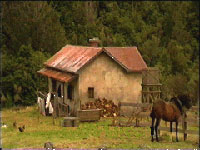Through the Ages – ‘Incident at Whitewater”
The Boer War
The war was fought in South Africa 1899-1902. It was fought between the Boers, descendants of Dutch settlers who had first come to South Africa in the 17th Century, and the British. The war was the result of growing hostilities and tensions that had built up over the 19th Century. During the century, Britain had increased the amount of South African territory under its possession.
In 1833 Slavery was abolished in the British Empire, including South Africa. The Boers were not happy with the amount of compensation given by the British government for the loss of their slaves.
At a similar time to this, the British government gave the native Bantu tribes control of an area cherished by the Boers. The Boers hatred of the British increased as a result.
Thousands of Boers begun “The Great Trek,” an attempt to find a place where they would be free from British domination and could make their own laws. They set up the independent Orange Free State and the Transvaal.
The discovery of gold in the Transvaal in 1886, brought with it an influx of prospectors – mainly British. Many of the riches from the gold fields were passing straight into British hands The Boers sought to protect itself from the growing number of Uitlanders (foreigners), refusing Uitlanders the vote and taxed them very heavily. The British felt aggrieved and considered they were being denied their rights to make a living.
War between Britain and the joint Transvaal – Orange Free State Boers, officially begun in October, 1899. British troops were shipped in. Britain experienced initial difficulties but by June 1900 both Transvaal and the Orange Free State had been captured by British forces.
However, the Boer forces were to prove very difficult to beat. Boers conducted guerilla warfare; attacking specified targets, disrupting communications, and hiding out in the countryside. The British, in a desperate attempt to achieve final victory, resorted to imprisoning many Boer civilians in concentration camps. The British, made up of approximately 350,000 troops, went through the Boer guerilla country area by area and herded out the 60,000 Boer troops. The Treaty of Vereeniging ended the war in May, 1902.
In the Treaty the Boers accepted British sovereignty but retained personal freedoms and property. Afrikaans, the Boer language, would continue to be spoken.
Britain lost 22,000 lives – two thirds of these were lost to disease.
The Boers lost 24,000 – 20,000 of those killed were in concentration camps.
Bitterness from the war was to plague South Africa for many years to come. Boer resentment towards the British was partly responsible for Afrikaaner nationalism that led to the setting up of Apartheid (racial separation) in South Africa during the 20th Century.


